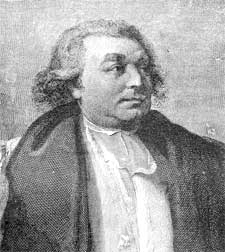Rev. Molly F. James, PhD
DFMS Noonday Prayer via Zoom
Commemoration of Samuel Seabury
May God’s Word be spoken. May God’s Word be heard. May that point us to the living Word who is Jesus Christ our Lord. Amen.
As I think most of you know, I am a priest in the Diocese of Connecticut. While I was ordained by the Diocese of Maine, I have lived in Connecticut for all of my ordained ministry. This means Samuel Seabury is an almost mythical figure. His portrait has a prominent spot in our diocesan offices, artifacts from his life and ministry abound. Our diocesan archives has his mitre, and I think some of his hair! His desk is the altar at Berkeley Divinity School. I think his chalice has been used at the consecration of all his successors. And so on . . .
We could focus on the life of Seabury and his significance in the history of our Church, but there are lots of texts that have already done that far more thoroughly than I could do in a homily. Rather I would like to focus on what his consecration as the first American bishop might mean for us now, as the staff and volunteers of the DFMS and as individual people of faith.
I think there are two profound and important lessons that his consecration can offer us. The first is that being connected to and in relationship with our tradition matters. Think about it. At the end of the Revolutionary War, our Church could have done the same thing the new national government did. It could have severed all ties with United Kingdom. It could have struck out on its own and said it was going to do its own thing. That might have been easier. No transatlantic travel involved. Leaders could have just written their own Prayer Book with whatever they wanted in it. Even when Seabury got to England and discovered that he couldn’t be ordained a bishop there without swearing an oath to the crown, he could have decided to just get on a boat and go home. He did not. He went to Scotland. He sought out another branch of the Church that had been ordained in historic succession, where he would not be required to swear an oath to the crown.
Seabury sought to stay in line with, in relationship with, the tradition he loved. He did not want to sever all the ties with the past. Our history matters. There is so much wisdom to be carried forward. We cannot do that if we ignore or toss out all that we have inherited. And Seabury’s venture to Scotland even ended up enriching our tradition. Our American Prayer Book is one that draws on the linguistic riches of both the English and the Scottish books.
Staying connected to tradition is as important for us as it was for Seabury and his compatriots. One of the many things I love about our Prayer Book is that it contains prayers and promises that have been prayed by the faithful for centuries. This gift grounds me and widens my perspective. Especially in these challenging times, it reminds me that I am not the only one who has faced hard times. Our ancestors in the faith have struggled. And they also found comfort and sustenance to carry on in the midst of it all. They have found inspiration and perspective.
in these beloved, familiar words. We can all be reminded that there is more to life than whatever is troubling us in this particular moment.
Which brings us to the second lesson from Seabury’s consecration, a reminder that we cannot go it alone. Seabury could not become a bishop without three other bishops participating in his ordination service, a requirement we still hold to today. Again, Seabury could have gone off on his own. The men (yes, all men) who elected him could have decided to establish a new church with singular leadership. They did not. They honored our connection to tradition. They chose a path that says even the most senior leadership in our Church is not a solo activity. In this time when we are all working in our own spaces, quite literally separated from our neighbors and our colleagues, it is all the more important for us to remember that we are a part of a team. We cannot, and we should not go it alone. Isolation can be lonely and troubling for our souls. It is also likely to make us less generative, less creative, less adaptive - all the things we need to be in the midst of our current challenges.
So on this day let us give thanks for the thread, the connection that traces back from us to Seabury, all the way back to the birth of our Church. May we give thanks for a polity (a Church structure) that does not let us do it all on our own. In whatever challenges we are facing today and in the days ahead, may we not forget all spiritual riches which we have inherited. Remember that we are not alone. We stand in a long line of faithful who have overcome great challenges, and we are blessed, deeply blessed to walk our journey with colleagues and friends who enrich us daily. AMEN.

No comments:
Post a Comment